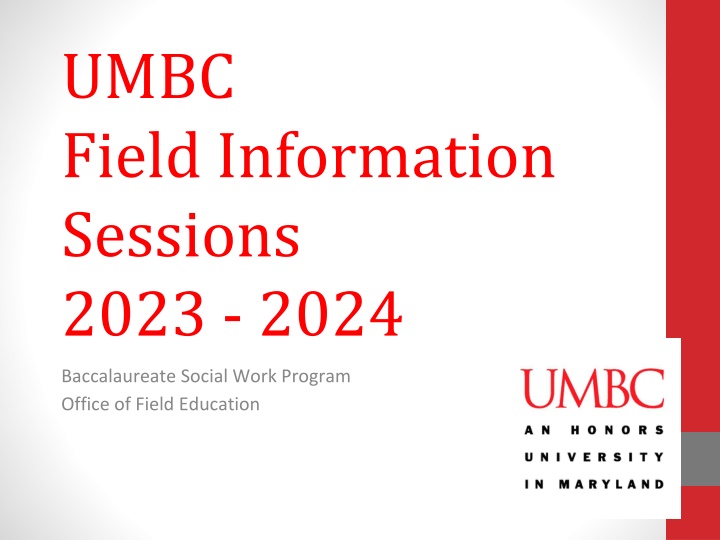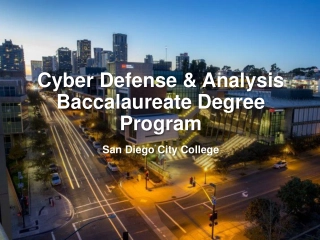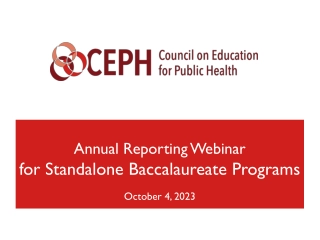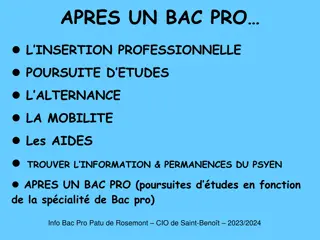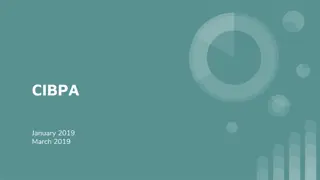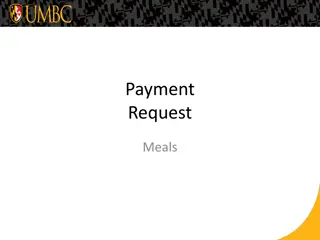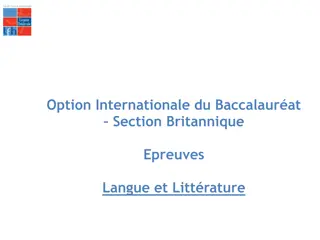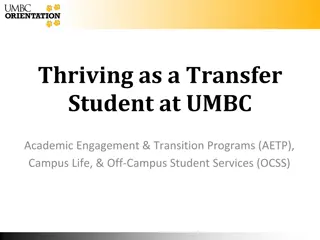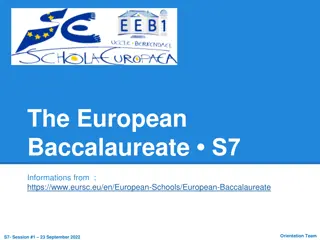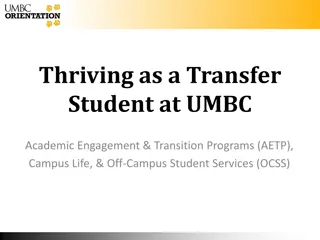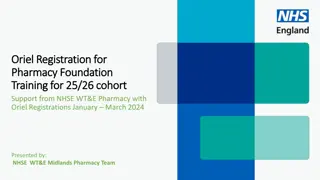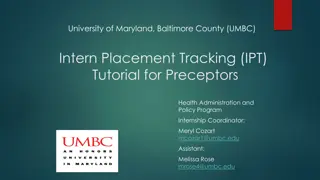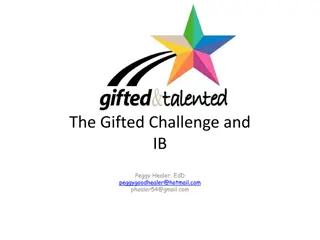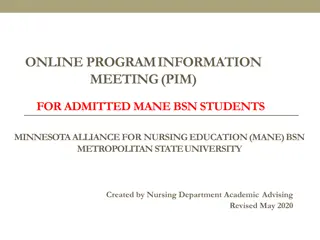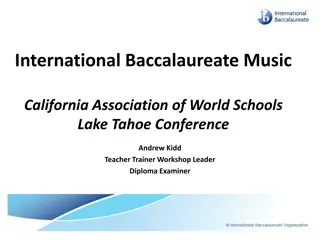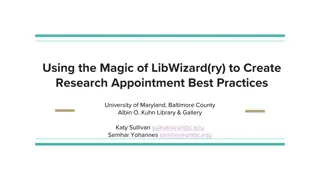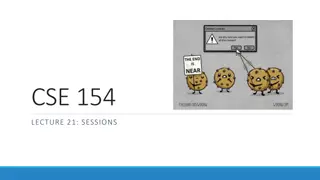UMBC Field Information Sessions 2023-2024 Baccalaureate Social Work Program
UMBC Field Education provides essential information for field placement applications, prerequisites, process, and guidelines for students pursuing a Baccalaureate Social Work Program. The presentation outlines course requirements, GPA criteria, application deadlines, placement eligibility, instructor qualifications, and student responsibilities.
Download Presentation

Please find below an Image/Link to download the presentation.
The content on the website is provided AS IS for your information and personal use only. It may not be sold, licensed, or shared on other websites without obtaining consent from the author.If you encounter any issues during the download, it is possible that the publisher has removed the file from their server.
You are allowed to download the files provided on this website for personal or commercial use, subject to the condition that they are used lawfully. All files are the property of their respective owners.
The content on the website is provided AS IS for your information and personal use only. It may not be sold, licensed, or shared on other websites without obtaining consent from the author.
E N D
Presentation Transcript
UMBC Field Information Sessions 2023 - 2024 Baccalaureate Social Work Program Office of Field Education
UMBC Field Education Congratulations! You are on your way to a field placement! This power point presentation contains all of the information that you will need to complete your online field application. After November 1st, please go to the Intern Placement Tracking website at www.runipt.com to access the Field Application and to update your Student Detail page.
UMBC Field Education (cont.) Students must meet all of the following prerequisites before they will be assigned a field placement: Complete SOWK 250, SOWK 260, SOWK 388, and SOWK 397 with a grade of "C" or better in each course. Have a cumulative Grade Point Average at least 2.5 by the end of the Spring, 2023 semester. Transfer grades will be combined with UMBC grades in order to calculate your cumulative GPA. Plan to graduate within three semesters of beginning field education: in May, August, or December of 2024. Students who are on academic probation, suspension, or dismissal are ineligible for field. ALL COMPLETED FIELD APPLICATIONS MUST BE SUBMITTED NO LATER THAN JANUARY 1, 2023.
UMBC Field Education (cont.) Students will need to obtain permission from the Office of Field Education prior to registering for Field Instruction (SOWK 480) and Methods II (SOWK 481). Students do not locate their own field placements; however, we welcome your input and suggestions. Note: The department does not arrange evening and weekend placements. Students who have documented accommodations with the Office of Student Disability Services are strongly recommended to meet with a representative prior to the start of the field placement to discuss possible accommodations. If accommodations are recommended for SOWK 480/482, it is the student s responsibility to share them with the field instructor. Field instructors must have a Master's Degree in Social Work (MSW) plus two years post-master's practice experience and must have been in the agency at least six months.
Field Placement Process October Faculty from the Office of Field Education meet with students planning to enter field the following academic year. The field placement process is explained and instructions are distributed. November Students complete field applications. Applications are submitted between November 1stand January 1st. January Field applications are due January 1st via Intern Placement Tracking (IPT). Applications are reviewed by faculty to determine field placement eligibility. If a student is not honest on their application, they may be denied a field placement.
Field Placement Process (cont.) January/February Students meet individually with faculty from the Office of Field Education to review applications (including resume and field placement letter), discuss interests and learning needs, and identify potential placement sites. An attempt is made to recognize individual student needs and interests and to match them with educationally sound field instruction settings. Students will not be placed in an agency where they or their family have received services.
Field Placement Process(cont.) February-August Students are referred to potential field sites (with field instructor contact information) by the Field Education faculty. Students receive a referral letter via email; the letter asks students to arrange an interview with the prospective field instructor. Prospective field instructors are simultaneously sent letters via email informing them of the student(s) being referred and they are also given a copy of the potential student s resume and field placement letter. Students are asked to contact the Office of Field Education to acknowledge that the interview took place and share thoughts about the meeting.
Field Interview Process The Office of Field Education strives to provide meaningful and educational field placements for all social work students. The placement and interview processes are designed to maximize student success in the field setting. A student is allowed a maximum of three placement interviews. If the student is not accepted, or chooses not to accept any of these placements, the student will not be able to go into the field sequence.
Field Interview Process (cont.) The student will be referred to a field agency by the Office of Field Education as agreed upon by the student and the field faculty. If the student is accepted by the agency and agrees the agency is a good fit for them, the student will be placed in the agency. If the first interview is not successful, the designated field faculty member will consult with the potential field instructor that interviewed the student to get specific feedback about the student and the interview. The field faculty will then meet with the student to discuss the feedback and strategies for a more successful interview. The student will then be given a second opportunity to interview at another site to better display their social work skills and fit to the agency. In the case that a student is accepted by an agency and the student declines the placement due to it not being a good fit, the field faculty will meet with the student to identify an agency that would be more commensurate with their learning goals.
Field Interview Process (cont.) If that second interview is not successful, students may submit a formal request to the Assistant Dean of Field Education to be allowed to have a third and final chance to interview at another field placement site. The formal request will include their reasons for the request and steps they will take to improve their interview. If a third interview is approved and is not successful, the student will be unable to continue in the field sequence and in the Baccalaureate Social Work Program. The student will have to change their major and develop a new academic plan. This will be completed in a required advising meeting with the student, the Assistant Dean of Field Education, and the student s academic advisor; a Change of Major form will be completed and submitted by the student.
Steps to Success with the Field Placement Interview A positive interview experience is an important part of students learning process and key to success obtaining a field placement. In order to facilitate success with the interview process, the following preparation steps for success are available to students: Be prepared to demonstrate your understanding of the relevant core competencies for Social Work during your interview. Use feedback from field faculty to improve your resume and field placement letter. Meet with field faculty for further discussion and support surrounding the field placement and interview process. Use the UMBC Career Center (https://careers.umbc.edu/) for resume support, interviewing practice, and other placement related resources.
Steps to Success with the Field Placement Interview (cont.) Attend an Interviewing for Success session offered by the Office of Field Education. Use the Office of Student Disability Services for assistance with accommodations for interview planning (if appropriate). Students who have documented accommodations with the Office of Student Disability Services (SDS) are strongly encouraged to meet with a SDS representative prior to the start of the field placement process to: 1) discuss whether accommodations may be needed in order to perform the fieldwork requirements effectively, and 2) to discuss what reasonable accommodations maybe appropriate in the fieldwork setting.
Calendar 16 hours per week for a total of 240 hours each semester (typically Tuesdays and Thursdays or Mondays and Wednesdays). Hours begin with the Student Field Orientation in August and continue until the end of April. Hours are not earned if the agency is closed (snow days, holidays, etc.). All students are required to remain in field 16 hours per week during the Winter Session: We also strongly discourage you from taking Winter Session courses. Spring Break (one week off during the spring semester). Even if hours are complete, students must work at the agency until the last day in field, during both the fall and spring semesters.
Resume Guidelines and Tips The primary purpose of the pre-field placement resume is for you to introduce yourself to potential future field instructors. It is important that your resume be well-written and free of grammatical, punctuation, and spelling errors. When writing a resume, action verbs are needed to describe work/volunteer experience. There are multiple websites that will provide a variety of action verbs according to different categories. You are strongly encouraged to take advantage of these valuable websites. Resume should be no longer than one page Margins should be no more than one inch Do not use fancy fonts; fonts should be 10.5 12 Use consistent formatting for headings and dates Do not use sentence or paragraph formatting Limit use of abbreviations Do not lie, exaggerate or use clich s (i.e., out of the box thinker ) Put your actual GPA; do not round up Leave out information about marital status, gender, height, weight, or health Do not list references PROOF READ YOUR RESUME
NAME UMBC Email Address Phone EDUCATION: University of Maryland, Baltimore County Major: Social Work Minor: Expected Graduation Date: GPA (only include GPA if it is above 3.0 for all schools attended - all or nothing) Baltimore, MD List prior college(s) attended Location List area of concentration and dates of attendance if a degree was not earned If a degree was earned, list the degree and graduation date *List education in chronological order, most recent first. Relevant Coursework: include relevant courses in your major and/or career field. *Only use if space permits SKILLS: Only list bilingual skills, or applicable certifications, such as First Aide or CPR WORK EXPERIENCE: Your title Name of Employer List positions in chronological order, most recent first Give a brief description of your responsibilities (use phrases or bullet points) Use action verbs to begin phrases describing duties VOLUNTEER EXPERIENCE: Your title Name of Company List positions in chronological order, most recent first Give a brief description of your responsibilities (use phrases) Use action verbs to begin phrases describing duties HONORS & AWARDS: *Only use if space permits EXTRACURRICULAR ACTIVITIES: *Only list if related to the field of Social Work, such as membership in NASW, Phi Alpha or the Social Work Student Association Month-Yr-Month-Yr City, State Month/Yr-Month/Yr City, State Please keep your resume to one page
Field Placement Letter and Tips The field placement letter introduces you to a potential field instructor and is their first impression of you. This letter allows you to go in-depth about important experiences/skills and relate them to expertise needed in the field of social work. It is important that the letter is well written, as it provides a sample of your writing skills and shows the field instructor that your are invested in demonstrating your interest and commitment to the field of social work. The field placement letter should: Be at least 1 full page, but not more than 2 pages single spaced Avoid redundancy and wordiness Use the same paper as your resume (in case you are asked to bring a paper copy to an interview) Not have any TYPOS Leave a space between addresses and dates in the heading Leave a space between your heading and greeting Leave a space between each paragraph Leave at least three spaces between your close (Sincerely) and your typed name Sign your name in ink between your close and typed name Be given to friends and/or colleagues for proofreading or suggestions Be PROOF READ after a few hours or days (improve sentences, grammar, typos)
Sample Field Placement Letter Name UMBC Email Phone Date This field placement letter is specifically designed to be used for your field application and will be sent directly to prospective field instructors. Please consider other resources for future cover letters. Since you do not know where you will be placed, broadly address your interest in the field of social work and your skills. Dear Prospective Field Instructor: In the opening paragraph address your interest in social work. Tell your story about how you chose social work vs. other majors which help people. As you are expressing your interest in becoming a social worker try to keep it broad so that you do not limit your field placement opportunities. The second and third paragraphs should include your skills, qualifications, and personal strengths. Briefly summarize any educational, work, or other experience that may have relevance to social work. Do not reiterate your resume. Please explain what you have learned from relevant past experiences and how the resulting skills and knowledge could benefit an agency. It is best to illustrate your skills through examples, skills, actions, awards, and classes rather than just stating you think you will be a good social worker. Show the reader rather than telling the reader. The final paragraph includes a referral to your enclosed resume. Reiterate your interest in social work, and thank the reader for her/his time and consideration. Sincerely, Susanna Contreras Susanna Contreras
Resume and Field Placement Letter Your letter and resume are the most important parts of your application and can affect whether an agency agrees to interview you or not. If you would like assistance or feedback regarding your resume, you can do one of the following: At UMBC s Main Campus Email Jeremiah Sawyer at the Career Services Center (jsawyer2@umbc.edu) and ask to make an appointment with him about reviewing your field placement resume. At UMBC s Shady Grove Campus Contact Katie Leiser via email at leiser@umbc.edu or Natalie Sanchez at natsanc@umbc.edu You are strongly encouraged to utilize the above resources!
Title IV-E Program The Title IV-E Education for Public Child Welfare Program is a partnership between the University of Maryland School of Social Work and the Maryland Department of Human Resources to prepare Bachelor of Social Work (BSW) and Master of Social Work (MSW) students for public child welfare practice. Federal Title IV-E child welfare funds support this effort to provide professional social work education to students preparing to practice in public child welfare programs such as Child Protective Services, Family Preservation, Foster Care, and Adoption. Child Welfare Student Units with faculty field instructors have been established in local Department of Social Services for a specialized child welfare field placement.
Title IV-E Program (cont.) To be selected for the Program, students must meet, at a minimum, the following conditions: express a specific interest in social work practice in public child welfare; have a 3.0 cumulative GPA; enroll in and successfully complete SOWK 387, Child Welfare Services; be a U.S. citizen or permanent resident of the United States; plan to apply to an MSW Program; and agree to seek and accept employment with the Maryland Department of Human Resources after graduation. Twelve months of employment obligation is incurred for each academic year (fall/spring semester) of participation.
Title IV-E Program (cont.) Title IV-E Information Sessions: Tuesday, November 15th@12:30pm via Zoom https://umaryland.zoom.us/j/94851807649 Thursday, November 17th@4pm via Zoom https://umaryland.zoom.us/j/93290005586 If you cannot attend, please contact Chris Wirt, Director of the Title IV-E program at Cwirt@ssw.umaryland.edu. Students must indicate that you are interested in the Title IV-E program on the field application. You will receive an application specifically for IV-E and it will be due by January 13th, 2023.
Final Information Please Note: Only complete applications will be processed. Please make sure that you are eligible for field and that your online application is complete by using the checklist below: _____ Field Placement Application _____ Updated Student Detail page (including a picture) _____ Current Resume _____ Field Placement Letter Field applications are accepted on a rolling basis from November 1st, 2022 January 1st, 2023 IN ORDER TO BE CONSIDERED FOR A FIELD PLACEMENT DURING THE 2023-2024 ACADEMIC YEAR, YOUR COMPLETED FIELD APPLICATION MUST BE SUBMITTED BY NO LATER THAN JANUARY 1st, 2023
Further Questions? Shady Grove students: Contact Katie Leiser at leiser@umbc.edu or 410-375-5719 or Natalie Sanchez at natsanc@umbc.edu or 240-565-2839 Main Campus students: Contact Adrienne Ekas at aekasm@umbc.edu Field Education website: https://socialwork.umbc.edu/field-education/
